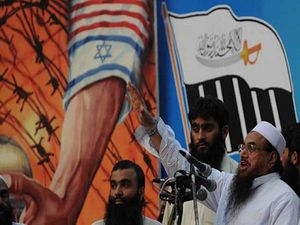I recently published a piece with The Diplomat discussing why Pakistan needed to contain Jamaat-ud-Dawa (JuD) before it was too late for the country.
The Pakistani government’s recent attempts to isolate the group are a clear indication that the state is losing its tolerance for Hafiz Saeed, the chief of the group, who is an internationally designated terrorist with a $10 million bounty on his head.
Although the group’s isolation and growing state scrutiny may not have happened due to its promises to target the Indian interests, it is the direct outcome of Saeed’s growing independence from the state to expand his militant network beyond Kashmir and India which in a way poses direct threat to Pakistan’s security interests.
The Pakistani government has asked for the group’s fundraising details including on the the Falah-e-Insayat Foundation (FIF). The FIF is the organization’s charity wing which reportedly manages all charity collections and fundraising for the group. While the FIF is not officially proscribed by the government, it is believed to have been used by the JuD to conceal its financial assets in order to avoid scrutiny.
According to Pakistan’s Dawn newspaper, a senior police official reportedly said that “the government had realized that the charity organization was not the real face of the outfit and had decided to look into how it spent the donations it collected from people in the name of charity.”
The government’s action has come in the wake of Kabul’s allegations that Saeed is coordinating the Islamic State’s activities in Afghanistan. (The nature of the allegations remains unconfirmed; the Afghan officials may have confused Hafiz Saeed with Hafiz Saeed Khan who is considered the chief of Islamic State of Khorasan Province) Regardless, a few months ago, the country’s counter terrorism department (CTD) arrested number of suspects belonging to the Islamic State who were also believed to be linked with JuD.
According to Arif Jamal, an expert on the group, “ISIS and JuD seem to be natural allies as far as their sectarian affiliations are concerned, but they seem unlikely to join forces in the near future.” While Saeed himself may not be interested in joining ISIS which would clearly jeopardize his ties with the country’s security agencies, the Salafi and extreme militaristic nature and ideology of the group may cause desertions in the lower ranks of the organization.
For now, the recent counter terrorism and military operations led by the Pakistani security agencies have proved effective in countering the Islamic State’s reported rise in the country but its unsure how long Islamabad can keep a lid on the group resurgence. In this regard, the danger of the potential rise of the Islamic State comes for groups such as JuD and other sectarian groups which have deep presence in the country.
The JuD’s leadership and the lower cadres are averse to Pakistan’s reconciliation with India and have always reacted furiously to any such development. In the midst of Kashmir crisis, the recent meeting of Pakistan and India’s border forces to enhance contacts on different border issues in a way sends clear message to Saeed that the state will not tolerate the group’s activities beyond what it may have allowed it quietly. The Indian interior minister, Rajnath Singh is also expected to visit Pakistan next week to attend the South Asian Association for Regional Cooperation (SAARC) summit which is taking place in Islamabad.
The JuD may have proven effective in yielding some military dividends for the Pakistani security agencies but the growing radicalization of its affiliates is inevitable to pose another militant challenge for the country. Moreover, it remains to be seen whether the Pakistani government’s long held silent approval for Saeed’s activities against India can keep the group at bay from joining the ranks of other terrorist groups. Unfortunately if that materializes, the Pakistani state will be pitted against a group with support base all across the country.

































